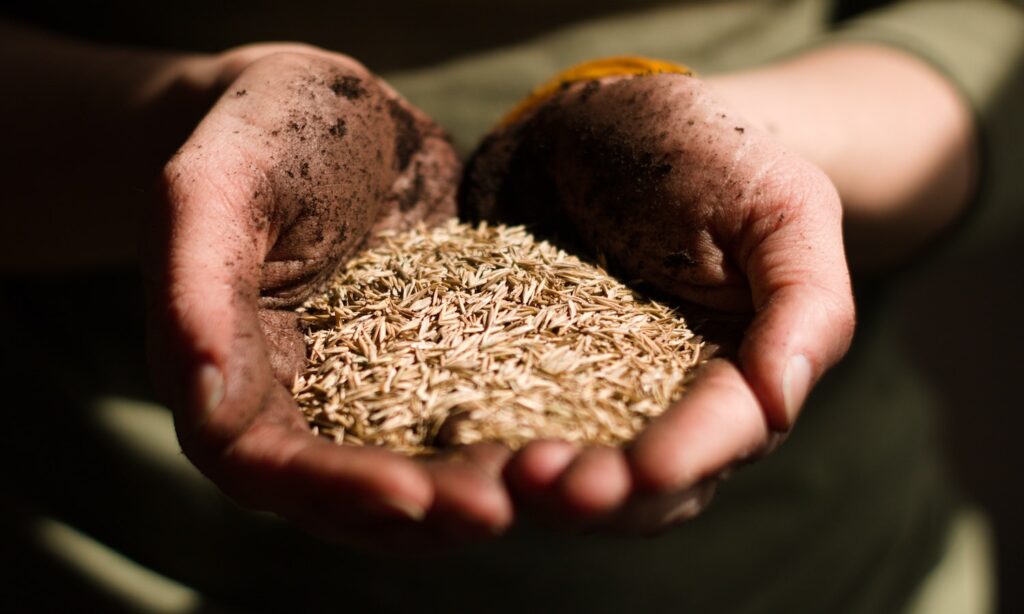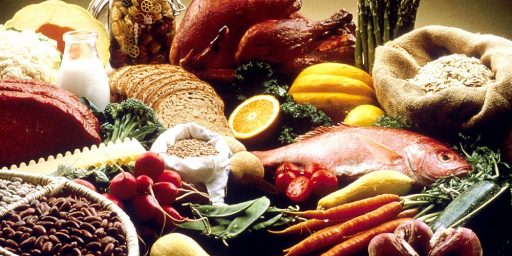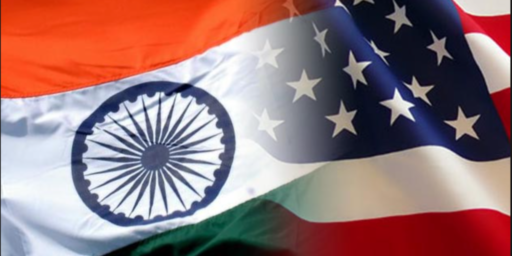Ukraine War Adding to Global Food Insecurity
Supply chain disruptions are contributing to crisis for 300 million people.

While we in the West are complaining about inflation and worried about a possible recession, things are really, really bad elsewhere. WSJ (“Rising Food Prices Roil Developing World“):
Soaring food prices are triggering shortages and protests across the developing world as disruption from the Ukraine war adds to existing strains on global supplies of grains, meat and other foodstuffs.
India on Saturday invoked a rare ban on wheat exports to help tame domestic prices, a move likely to exacerbate global strains. The country is the world’s second-largest wheat grower, behind China. Late last month, Indonesia halted the export of certain types of palm oil in an effort to lower soaring prices of cooking oil at home.
Rising prices helped stoke the violent unrest that led to the resignation of Sri Lanka’s prime minister earlier this week and have fanned more peaceful protests in the Middle East. In parts of Africa, millers have run out of wheat. Consumers are skimping on food items once considered everyday staples and substituting cheaper products.
On Thursday, the head of the United Nations World Food Program said the globe faces outright food shortages as early as next year if Ukrainian seaports remain blocked by Russia.
Food prices had been heading higher since last year, hit by supply-chain disruptions related to the Covid-19 pandemic and poor harvests in the U.S., Canada and other countries. Then, Russia’s invasion of Ukraine choked off a significant slice of sunflower oil, wheat and corn exports, while disrupting the flow of fertilizers needed to increase crop yields. Ukraine is responsible for 10% of global wheat exports, 14% of corn exports and roughly half of the world’s sunflower oil, according to the U.S. Department of Agriculture.
Russia’s massive grain exports also risk being affected by sanctions and insecurity in the Black Sea. Moscow has stopped exporting fertilizer.
The executive director of the World Food Program, David Beasley, told a conference in New York that Ukrainian ports must reopen before the harvesting season, which begins in earnest in mid-June, to prevent shortages next year. Some 300 million people could face “crisis levels of acute food insecurity in the coming months,” he said earlier in written U.S. Senate testimony.
Mid-June, of course, is a month from now. Let’s just say that it’s an extremely unlikely target to be hit.
Obviously, the richest countries are feeling some of these effects and those who were already struggling to feed their families are stressed:
Even in the world’s richest nations, higher food prices are causing strain. Norwegian food-bank charity Matsentralen Norge says it has distributed 28% more food compared with the same period in 2021, a year that in itself saw sharply higher demand. U.S. grocery prices in April were up 10.8% over the past 12 months, the largest annual increase since November 1980, according to the Labor Department.
U.K. supermarkets have rationed sunflower oil. John Allan, chairman of British grocery giant Tesco PLC, told the British Broadcasting Corp. this week that the country is seeing “real food poverty” for the first time in a generation.
But at least there are assistance programs in place and most can simply make substitutions.
But it is in the world’s poorest countries where the effects of the Ukraine conflict on food prices are being felt most sharply.
A drought is ravishing northern Kenya. But local farmers asked Craig Redmond, a senior official at Mercy Corps, a nonprofit that helps distribute aid, about the war in Ukraine during a recent visit there.
“I have never seen a situation where people see so very clearly geopolitics’ impact” on food supplies, he said.
The war is happening at a time when other big producers are suffering their own challenges. A searing heat wave and lack of rainfall in India has forced it to downgrade its wheat production estimate by almost 6%, after five years of bumper harvests.
India is a crucial supplier of wheat to its neighbors. Afghanistan recently received large consignments of wheat from India on humanitarian grounds. Bangladesh is another big importer of Indian wheat. Prices, meanwhile, have soared inside the country, helping trigger Saturday’s export restrictions. “The food security of India, neighboring and other vulnerable countries is at risk,” said India’s Directorate General of Foreign Trade in a notice explaining the ban.
There’s a whole lot more in the piece, including drought in the American Midwest that’s adding to the problem.






All of us in emerging markets investment have been in deep worry about this since the first weeks of the war.
As I think I commented here early on, I do very much hope that the Biden Administration has been really paying attention to this and not just arms to Ukraine, as much more than the Russian borders, it is this where the security crisis will arise. Africa and Asia. Rather serious.
Example article: relative to the MENA region. For myself, we have had to suspend RE investment plans for Tunisia on the strong expectation of a sovereign default while at the same time bakeries are rationing the amount of bread they sell. This sort of thing has not been seen since the late 70s / early 80s. Quite bad.
I read a blurb the other day that they are working on getting the wheat out thru Poland via rail. I have no idea how feasible that is or the limitations of it.
@OzarkHillbilly: Rail lines exist, so it is feasible, however there are substantial constraints of which the export infrastructure for handling logistics is oriented to Black Sea shipping for very rational economic reasons. One needs appropriate rail cars, loading, etc.
Additionally same rail lines are being used to bring in weapons so will be subject to Russian strikes.
All this implies added expense, but of course is better than nothing.
@Lounsbury:
To add to the infrastructure barriers, Ukraine’s rail system uses a gauge common to Russia’s, not western Europe and the US, and specifically Poland. Supplying equipment won’t be as simple as moving in surplus hopper cars from other countries. Adding to the logistical complications will be needing to unload and then load the grain on a different train at the Polish border.
@Lounsbury:
From time to time parts of the Great Plains in the US have a bumper year with unexpectedly high grain yields. In those years it is common for grain to sit in huge piles at loading facilities for weeks or months because the US railroads are not capable of finding enough cars or moving cars to the appropriate areas in order to meet the demand in a timely fashion.
@Sleeping Dog: Yes, I forgot to mention that. Substantial logistical barrier, cost point. Every handlling point adds time and cost. I suppose that there are probably some adjustable gauge cars available, but one can doubt enough and particularly not enough of grains hoppers at adjustable guage. (as an aside if EU and USA want to help Ukraine divorse from Russia, invest in EU oriented infra, like rebuilding gauges. Long term, big capital, but it is permanent lock-in)
@Michael Cain: Not surprised, food logistics is rather more complex than most people realise, above all if one wishes to avoid significant or material loss rates. and that is USA.
I am presently raising an invesment vehicle in a climate change perspective – as an aspect of my RE investment work – for Ag Logistics. Far too many people don’t see the connection, but with loss rates in post-field collection to distribution networks running 40% to jaw dropping 60% in developing markets, proper logistical infra for food – perishables and staples – is going to be the difference between cities burning in mass revolt and starvation, and assorted ugliness. Massive waste of water, inputs, and thus energy…. Rather than people doing bloody fucking apps and blockchain, we should be investing massively in RE and food infra. Apps don’t solve lack of bloody physical operating infrastructure.
At least the issue is getting high level attention:
The European Union is finalizing a plan to facilitate land exports of Ukraine’s stocks of food products.
And the G7 is discussing possible ways of bypassing or breaking the blockade.
One idea I’ve heard of: extending the Ukraine gauge rail lines a little way into Poland, to new multiple line shunting and transfer yards, where they can mate up with European standard lines for forwarding.
A massive job, obviously.
Another, quicker to implement, idea heard on BBC Radio news discussion with an RUSI guy (I think):
If Turkey approves, get a neutral to provide minesweeping and escort for grain convoys from Odesa to the Straits.
Egypt would be the perfect candidate: neutral, with a sizable navy including crucial minesweeping ships.
And Egypt has a massive incentive to participate; it really needs the grain supply.
Also some speculation that recent fighting centred on Snake Island, may relate to prospects for later clearing a sea route to Odesa.
@JohnSF: Important efforts, really it is very easy to underestimate the degree to which both by price shock and pure availability
I hope entire NATO alliance is thinking hard not just about weapons but also food-as-security (political security).
Although Egyptian escort seems unlikely to me
India is the world’s second-largest what exporter. Well, make that “was” a wheat exporter. It just announced that is is stopping exports because of domestic food supply concerns.
@Lounsbury:
Yes, changing rail gauge is a b_tch, it adds significand delays and cost, unless they could just load up standard containers and use cranes to just shift them from flatbed car to flatbed car.
There is another option, get it by Ukrainian (wide gauge) rail to the Danube, and put it on barges. Putin bombed the crucial bridge over the Dnestr River, so it is no longer straightforward, it would now have to transit Transnistria and Moldova.
Once loaded on barges, the grain can either go up the Danube up to Austria and Germany; or else to the Romanian port of Constanta (there is a separate Canal from the Danube to Constanta), loaded on trans-oceanic ships, and shipped to Egypt etc.